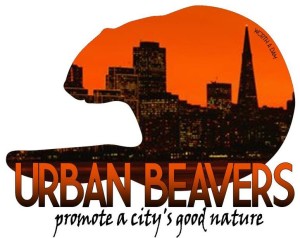Last month I spoke to a Ethan about the Martinez beavers and his idea for beavers in New York city. I wasn’t sure what would become of our conversation, but I was very pleased to see this last night.
Hot Dam
A radical, beaver-filled idea to improve city parks
Imagine a New York City brimming with life. A city where bullfrogs sing in marshes, where otters and muskrats frolic along the waterfront, and where kingfishers perform aerial acrobatics into ponds thick with fish.
This may seem like a distant dream. But what if I told you that New York could take a meaningful step toward this urban paradise with a little help from a humble rodent?
I’m talking, of course, about beavers.
People all over are starting to think about beavers in their neighborhoods and whether that could improve biodiversity. Well yes it could. But beavers aren’t throw pillows. You can’t just tuck a few where you want them and expect them to brighten the space.
They might have their own ideas.
 But beavers, I realized one day, are not particularly large—and they prefer to stay in the water, away from dogs and small children. The question was: Would it be possible to introduce a small population of these semiaquatic rodents somewhere like Prospect Park?
But beavers, I realized one day, are not particularly large—and they prefer to stay in the water, away from dogs and small children. The question was: Would it be possible to introduce a small population of these semiaquatic rodents somewhere like Prospect Park?
“Oh, I think it’s possible. I totally do,” Benjamin Dittbrenner, a beaver expert at Northeastern University, told me.
Beavers can live in a relatively small area, Dittbrenner said, as long as there’s enough food and water. Prospect Park has plenty of water in its creeks, ponds, and lake—and those waterways are full of potential beaver food like pondweed. Beavers will also gnaw down trees along the water to open up space and stimulate the growth of the shrubby vegetation they love to eat, Dittbrenner said.
It was Ben who suggested the reporter might want to talk to me about what happens when beavers move into a city. Which I was happy about because I think Martinez makes a fine test case story.
That’s not to say bringing beavers to the big city would be easy.
In a place like Prospect Park, if a beaver were to dam up a creek, those creeks could flood, submerging nearby trails and amenities. Plus, the beavers would go to town on some of the park’s trees.
But these problems are manageable. To start, beavers don’t like to move very far over land, Fairfax said, meaning that only the trees closest to water would be at risk for gnawing—and the city could wrap fences around more important trees. The park could also plant some of the beavers’ preferred species, like willows, to supplement their food options, Dittbrenner suggested.
When it comes to flooding, as dedicated to hydrological interference as beavers are, humans are also pretty crafty. “Beavers: amazing engineers. People: also amazing engineers,” Fairfax said.
We’ve invented various ways of outsmarting beavers with contraptions like “pond levelers,” which drain water out of beaver ponds and limit flood potential. When trails do flood, the park can build signs to help people understand why the trails are flooding—Fairfax noted that ongoing environmental education is important for any urban beaver population. And when in doubt, the city could always build a boardwalk to help parkgoers cross over newly muddy patches. “People love boardwalks,” Fairfax said.
Happy that this got worked into the conversation. People need solutions when coexisting with urban beavers. And do they work?

Children watching beaver in urban environment
Martinez, CA
Beavers can also bring a lot of joy to a community. In 2006, beavers moved into Alhambra Creek, which runs right through downtown M.artinez, California. Initially, the city wanted to kill the animals because of flooding concerns, but many Martinez residents quickly protested the removal plan. This was partly because of local political quarrels, Heidi Perryman, a Martinez local and beaver advocate, told me—but at a 2007 City Council meeting to discuss the beavers’ fate, many locals also expressed their appreciation for the animals.
Eventually, the city installed a device to prevent the creek from flooding and wrapped some of the trees to prevent gnawing. The beavers, meanwhile, got to work transforming Alhambra Creek into a lush, vegetated habitat filled with animals like otters and green herons. Even though the beavers moved away from Martinez a few years ago, the city still hosts an annual Beaver Festival.
Tadaa! Martinez beavers in SLATE! Our little story and beaver festival in Slate! This must be kind of a big deal because Mark Ross himself wrote me back last night when I sent him this article.
What if, instead of trying to manage around our local ecosystems, we let our ecosystems manage us for a change? What if we let some beavers chop down a few trees, creating little glades of open sky next to our ponds? What if we embraced some flooding around our parks as biodiverse wetlands and vernal pools replaced sterile, trimmed lawns? What if, as Fairfax suggested, we reconnected Prospect Park to New York harbor by digging a canal through Brooklyn toward the East River or the bay?
Four hundred years ago, beavers covered New York City, building dams and engineering wetlands that shaped and nourished the local ecosystem. In our own efforts to manipulate and control nature, we’ve driven countless species toward extinction and pushed the world into climate crisis. Beavers are, in Dittbrenner’s words, “chaos-makers.” But maybe it’s time to stop separating ourselves from the chaos that is ecology, and instead embrace something disorderly, bold, and revolutionary—something, dare I say, bucktoothed.
Sounds plenty good to me.






































